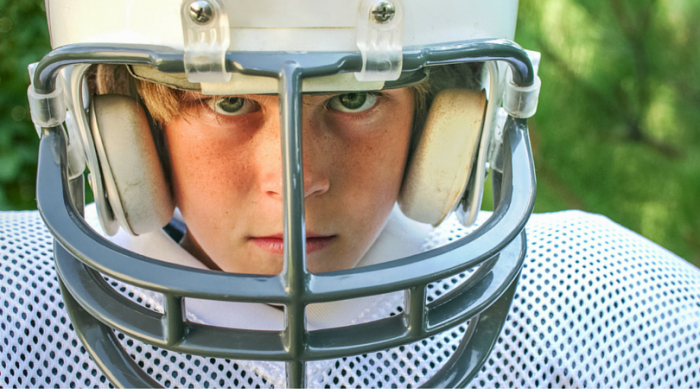
As the executive control center of the entire body, your brain drives your every thought, mood, emotion, reaction and memory. Since it’s so indispensable to everything you do, you need to protect your brain and the brains of those you love, especially your kids.
The prefrontal cortex (PFC), the part of the brain that’s involved with decision-making, judgment, forethought, focus and impulse control, isn’t fully developed until about age 25. For this reason, it’s crucial that you make decisions in the best interest of your children and help protect their brains during their rough-and-tumble years.
Avoid High-risk Sports
If a child or teen really wants to play a sport that’s known to be dangerous, should their parents just go along with it? To spin it a different way, if a child wanted to do cocaine, would a parent help them find a drug dealer? Of course not!
Unfortunately, too many parents allow their kids to engage in sports that put their brains at risk: tackle football, ice hockey, rugby, boxing, cheerleading, and bouncing soccer balls off their heads – to name a few. These sports all have a high risk of concussion.
Since the resulting impairment from a concussion often resembles what drugs do to the brain, how can parents allow their kids to play high-risk sports that can give them brain damage and negatively impact the rest of their lives? Regardless of what coaches, doctors or other “experts” say, the best advice is to keep your kid out of the game. The risk is far too great when it comes to punishing contact sports.
Take It from the Concussion Expert
The work of Dr. Bennet Omalu, who identified the physical brain pathology of Chronic Traumatic Encephalopathy (CTE), is featured in the movie “Concussion.” The film is a hard-hitting wakeup call that reveals the devastating, long-term ramifications of head trauma.
Regarding the impact of repeated blows to the head, Dr. Omalu says:
“If a child who plays football is subjected to advanced radiological and neurocognitive studies during the season and several months after the season, there can be evidence of brain damage at the cellular level of brain functioning, even if there were no documented concussions or reported symptoms. If that child continues to play over many seasons, these cellular injuries accumulate to cause irreversible brain damage.”
The Dangers of Undiagnosed Concussions
The dangers of playing football, at any level, have been well documented. Though the sport has made modest attempts at protecting players in recent years, such safeguards aren’t enough and represent minimal effort on the part of a sport that leaves players with cognitive and memory issues so severe many will have difficulties navigating the challenges of life down the road. The devastated lives of many former NFL players give testimony to this fact.
While news headlines have focused primarily on professional athletes and veterans, concussions and traumatic brain injuries (TBI) occur every day among the general population. Falls, sport-related injuries, assaults, and accidents lead to nearly 2 million ER visits every year, on top of the hundreds of thousands of head traumas that are never reported, and therefore, never diagnosed or treated.
Undiagnosed concussions are a serious problem since even mild TBI’s can have far-reaching health consequences. Head injuries are a major cause of psychiatric disorders including anxiety, depression, substance abuse and even memory issues and Alzheimer’s disease.
If you or a child has suffered a concussion or TBI, don’t delay in implementing these 3 recovery strategies:
Brain Healthy Sports
Instead of high-risk sports like football and hockey, encourage your kids to pursue brain healthy sports like cross-country running or swimming. There are many other sports that your kids can participate in that are safer and just as enjoyable. Learn what other interests your children have and help them shift to activities that will allow them to have healthy brains and healthy lives.
Seek Recovery
If you or a child have had a concussion or TBI, the good news is that it is possible to rehabilitate your brain. You aren’t stuck with the brain you have – even if you’ve had serious hits to the head. Here are some brain healthy ways to recover what you’ve lost.
Take a Look
How can you really know if you have a head injury unless you get an image of your brain? Brain SPECT imaging is the best tool for determining if your brain has suffered functional damage from a concussion or TBI.
Brain SPECT imaging can:
• Help identify if there has been brain trauma
• Show brain blood flow deficits NOT visible in anatomical studies, such as CT or MRI
• Identify affected brain systems
• Help determine if there could be co-occurring conditions that need treatment
• Increase treatment compliance by showing pictures of results
• Provide scientific documentation that may help with special services or legal issues
Our Full Evaluation includes two SPECT images (concentrating and resting states), a detailed clinical history, neuropsychological testing and comprehensive evaluation with one of our doctors to target treatment specifically to your brain, using the least toxic, most effective means.
If you or a loved one have suffered a concussion or TBI and are experiencing anxiety, depression, aggressive behaviors, or memory loss, call us today at 888-288-9834 or visit us online to schedule a visit.





Our 18 yrs old daughter with autism has been banging her head with her hand and biting her forearm for almost all of her adolescence. We have consulted with Amen Clinic in Reston, VA and NYC (by phone), yet she cannot remain still enough for a SpectScan or EEG. The doctors we talked to at a cost of $1000 said they couldn’t provide much more than an educated guess without the pictures. That was a couple of years ago. Have you found anything recently that might help her?
Comment by Barry Stern — September 12, 2018 @ 4:28 AM
In August, 2016, I was evaluated by your Amen Clinic in Reston, VA. There Dr. Jorandby mentioned that I had a brain injury I did not remember in my Prefrontal Cortex (I flew into my grandfather’s car’s front window, in days there were no seat belt requirements, at about age 8). She recommended I take a Psychostimulant, (Vyvanse 50-80 mg/day) but my Psychiatrist at home refused to give it to me due to “risks of taking stimulants at my age”. No antidepressants or anti-anxiety medications have shown any tangible results over the last 35 years far, and I experience constant mental anguish over my inability to control my moods and/or perpetual ADD problems. I am 76 years old & still miserable. I tried Neurofeedback , also at Dr. Jorandby’s suggestion. and the Psychologist at the feedback center suggested I try to treat my ADD instead since that seems to be at the root of my anxiety/depression. I am back being told to seek a stimulant that my Psychiatrist refuses to give me!!! Because I am on Medicare, few Psychiatrists will take me. In this dilemma I need a real expert up on different ways to handle difficult problems for people for whom no medications are working. Neurofeedback is not enough. I hate the thought of feeling miserable the rest of my life, and know Dr. Jorandby cannot prescribe from a distance. Please tell me what to do.
I am supporting my daughter due to a degenerative disease, and her daughter. I could barely afford to come to your clinic once, let alone again, with no help from Medicare to speak of. Please help me to know where to go and what to do. Thank you.
Comment by Sally Thompson — September 12, 2018 @ 5:50 AM
So if a person had minor head injuries possibly concussions years ago, is there anything that can be done now years later to help them with anxiety, depression….?
My son inadvertently has knocked his head or been knocked in the head so many times. He never played sports but was an active child, falling out of trees, off trapeze and swings, having a hay bale fall on his head and knock him out of hayloft, run into things with his head(when very little), falling off bike with no helmet, skate board mishaps, oh and he was a head banger when he was really little and all those things that kids just do and probably many I will never know about. Now he is 24 and is having anxiety, depression, there was drug use, ADD, now just marijuana to self medicate and anger management issues. I feel some of this may have stemmed from him having a head injury. So just wondering if it is too late to help him or not.
Thanks,
Kim Holt
Comment by Kim Holt — September 12, 2018 @ 8:12 AM
Hello Kim, thank you for reaching out and sharing about your son. We will have a Care Coordinator reach out to you directly to discuss further, but it’s certainly never too late to seek treatment. At Amen Clinics we utilize Brain SPECT Imaging to see what areas of the brain are affected by possible traumas, and from there we develop a customized approach to care for each individual patient’s needs. To reach us directly, please call 888-288-9834. For more information on our site, please see more about SPECT here: https://amenclinics.com/the-science/why-spect/; and a list of treatments here: https://amenclinics.com/services/.
Comment by Amen Clinics — September 12, 2018 @ 2:36 PM
Hello Sally, thank you for reaching out. We’d like to have the Reston, VA clinic to reach out to you to see if there is additional assistance they can provide. We certainly want to help in any way that we can!
Comment by Amen Clinics — September 12, 2018 @ 2:37 PM
Hello Barry, thank you for reaching out and updating us on your daughter. We will have our Reston, VA clinic reach out to you to see if there is additional assistance we can provide for her. We would certainly like to help!
Comment by Amen Clinics — September 12, 2018 @ 2:39 PM
High quality suppliments like Empower Plus by True hope.com and Ultimate Classic by Youngevity will nourish the brain and body in such a way that such symptoms will be signicantly reduced or stopped completely. Please research and try these approaches
Comment by Tim buckley — September 14, 2018 @ 7:32 AM
Hello ,
So appreciate the work of Dr Amen I am a meMber of the A4M and have listened to his lectures and have read his books ie Changed Brains , changed minds , I
I practice medicine in the Tulsa Ok region and Location of the Laurette psychiatric institute u may be familiar with , I have pts for social economic reasons can not afford to travel
My question .? I would like to know if PET CT is appropriate equivalent To the type of scanning you do and if not …. do u know the closet location for such testing ?
Thanks so much !!
Comment by Dominic Totani — September 14, 2018 @ 11:51 PM
Hello,
Can you redirect me to some litterature from Dr. Amen on head injuries in babies 0-3 years old when they fall and hit their head on the floor or a table etc…
I am reading about babies falling and found a lot of comments from mothers stating that it is a common thing (falling from a table, from the bed, from the parents arms).
Are their life-long consequences when babies fall and hit their little heads, and does Dr. Amen recommend CT scans in babies 0-3 years old or is it too early?
Thank you
Comment by Mouna — July 13, 2019 @ 9:51 AM